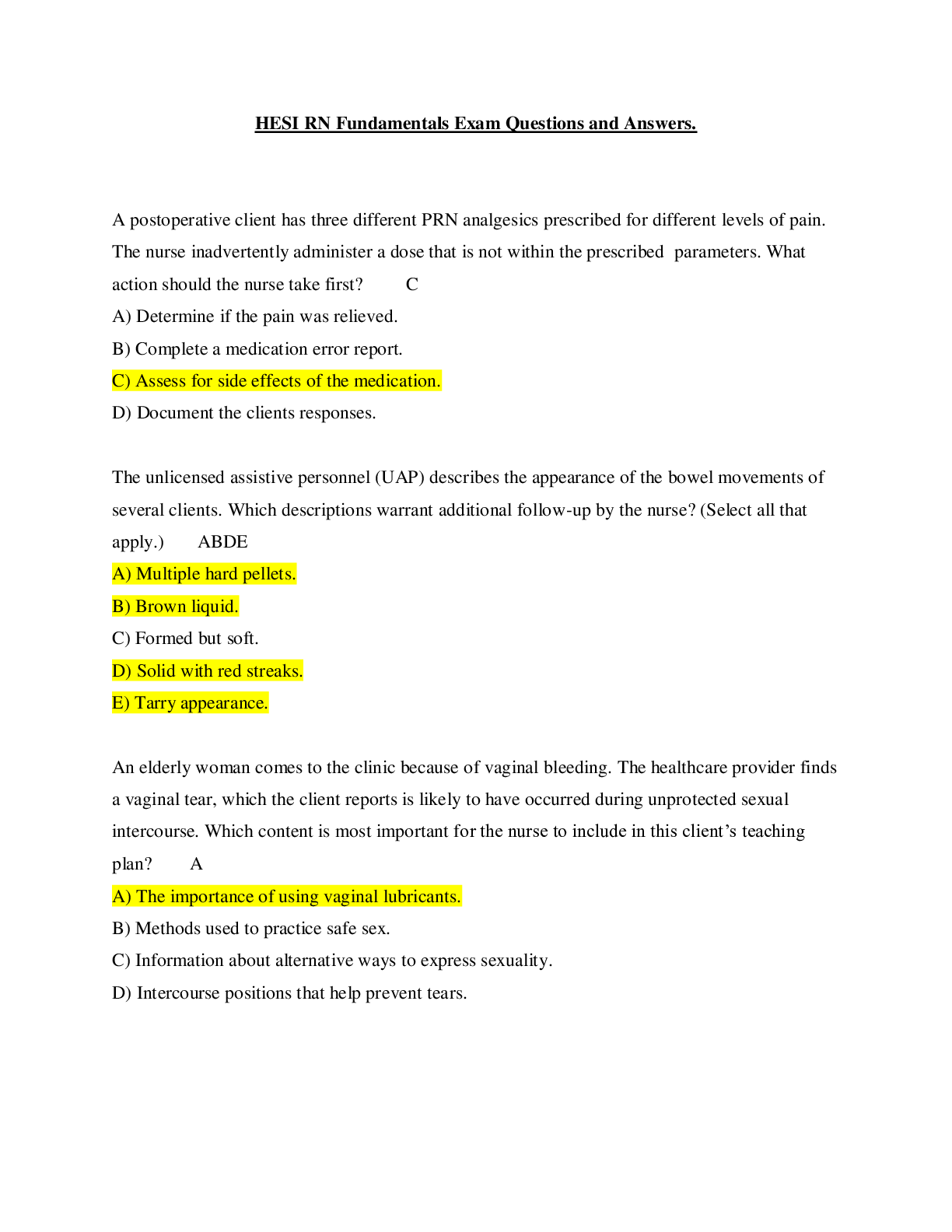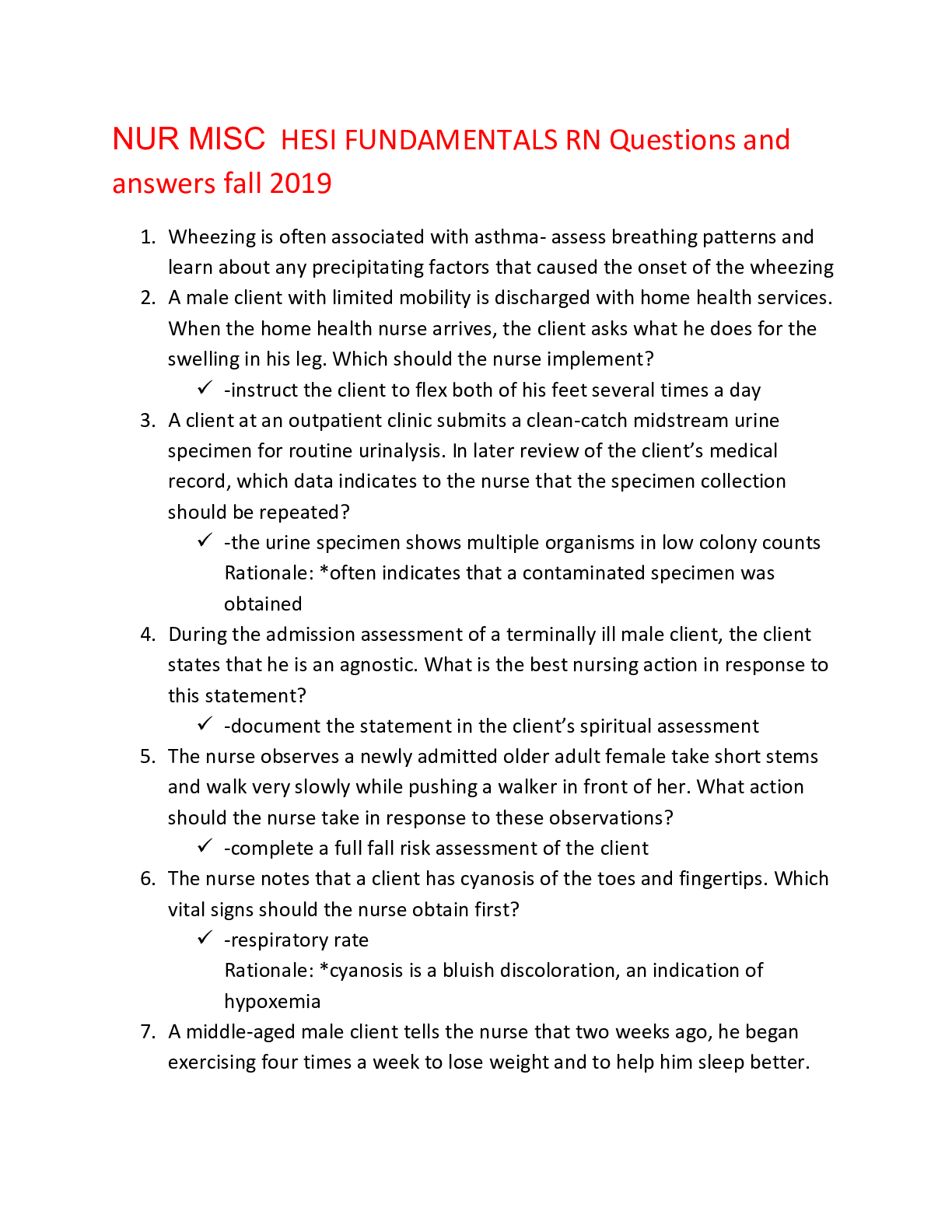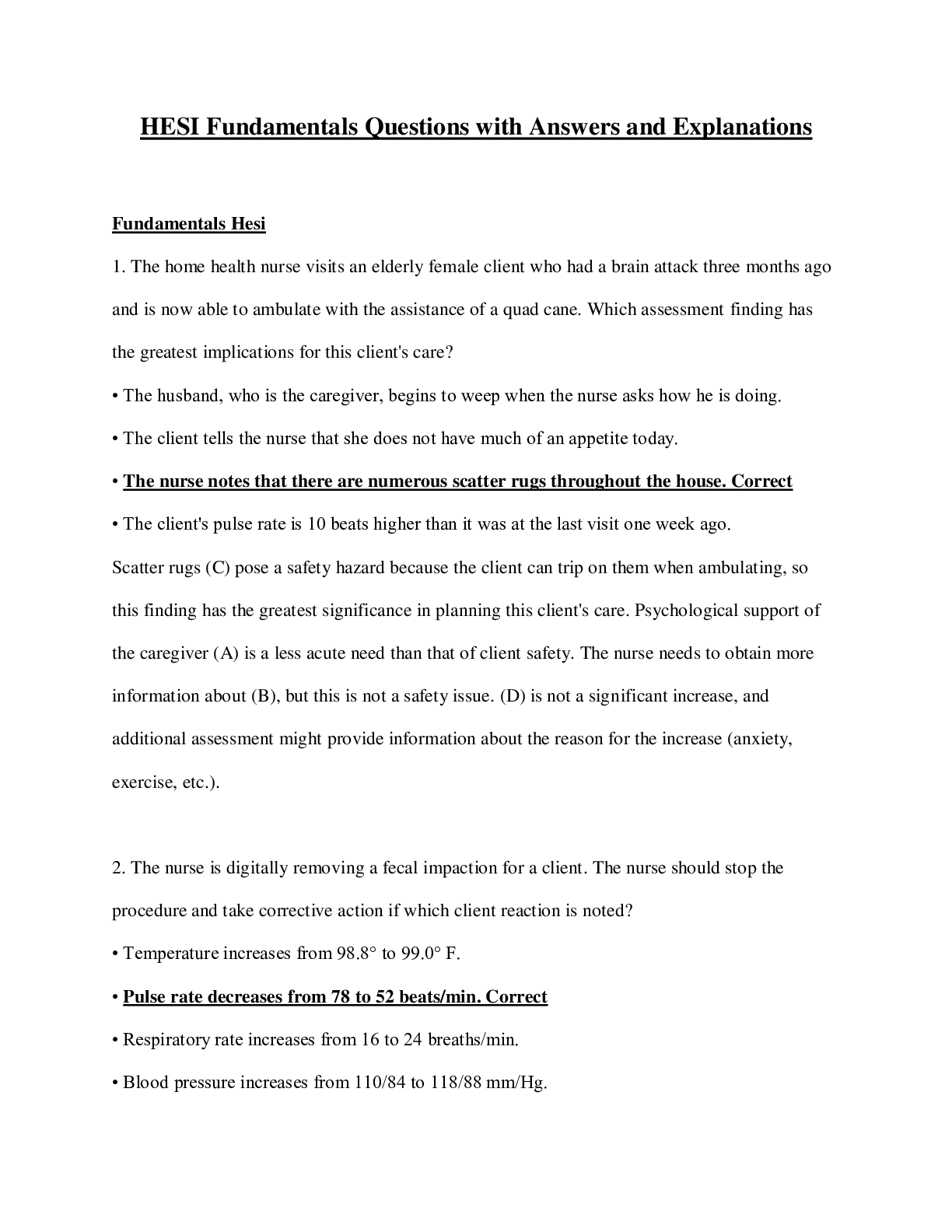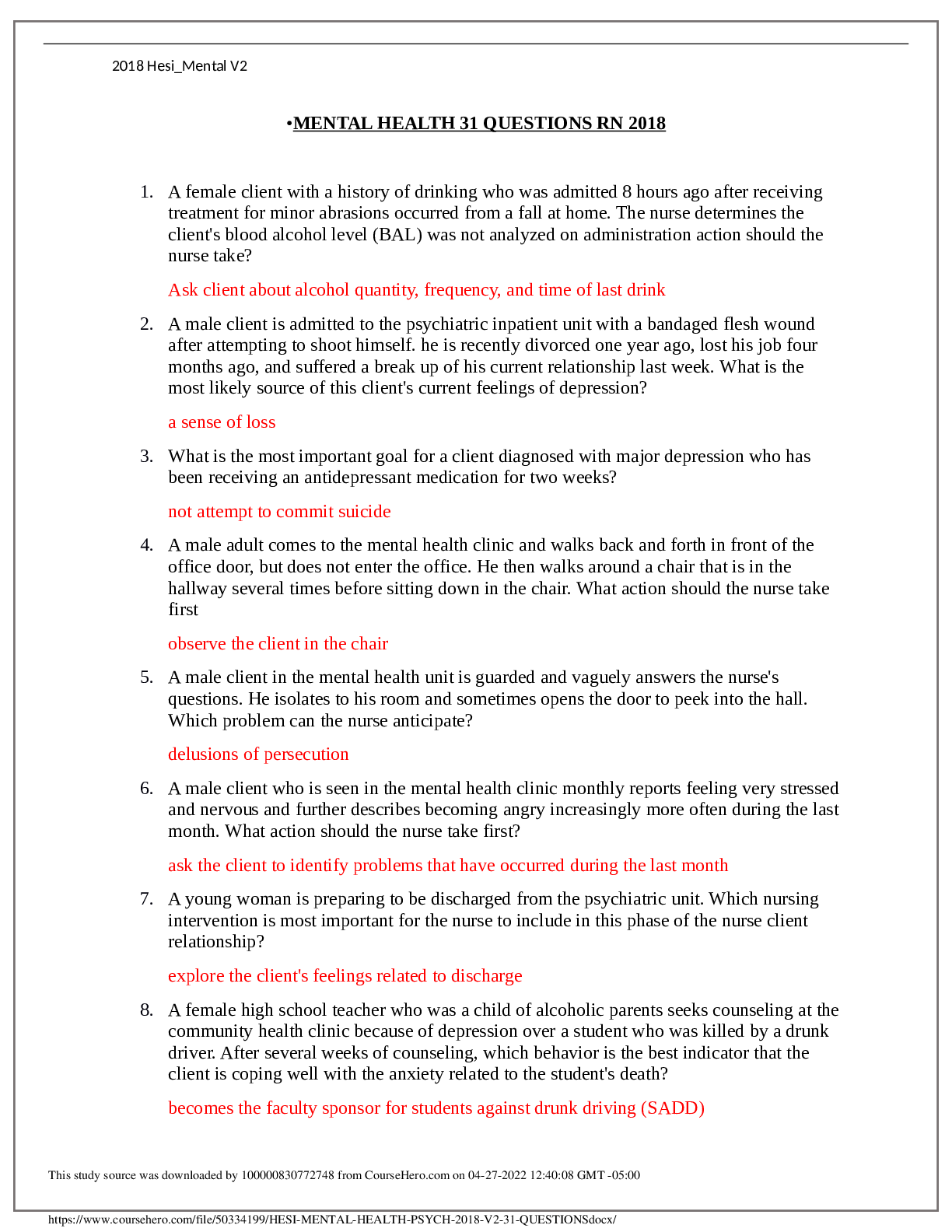MENTAL HESI TEST 6 QUESTIONS 7 ANSWERS WITH RATIONALE,100% CORRECT
Document Content and Description Below
A nurse working in the emergency department of a children's hospital admits a child whose injuries could have been the result of abuse. Which statement most accurately describes the nurse's responsibi... lity in cases of suspected child abuse? A. Obtain objective data such as radiographs before reporting suspicions. B. Confirm suspicions of abuse with the healthcare provider. C. Report any case of suspected child abuse. D. Document injuries to confirm suspected abuse. 2. An 8-year-old child is seen in the clinic with a green vaginal discharge. What action is most important for the nurse to implement? A. Assess the child's blood pressure. B. Counsel the child to wear cotton underwear. C. Report as suspected child abuse. D. Determine if the child takes bubble baths. . 3. On admission, a highly anxious client is described as delusional. The nurse understands that delusions are most likely to occur with which disorder? A. Dissociative disorders B. Personality disorders C. Anxiety disorders D. Psychotic disorders 4. Over a period of several weeks, one male participant of a socialization group at a community daycare center for older adults monopolizes most of the group's time and interrupts others when they are talking. What is the best action for the nurse to take in this situation? A. Talk to him outside the group about his behavior. B. Ask him to give others a chance to talk. C. Allow the group to handle the problem. D. Ask him to join another group. 5. A 22-year-old female client is admitted to the psychiatric unit from the medical unit following a suicide attempt with an overdose of diazepam (Valium). When developing the nursing care plan for this client, what intervention would be most important to include? A. Assist her to focus on her strengths. B. Set limits on her self-defacing comments. C. Remind her of daily activities in the milieu. D. Assist her to identify why she was self-destructive. 6. The nurse reviews the laboratory findings for a client's urine drug screen that is positive for cocaine. Which client behavior should be expected during cocaine withdrawal? A. Psychomotor impairment B. Agitation and hyperactivity C. Detachment from reality and drowsiness D. Distorted perceptions and hallucinations 7. A 25-year-old client has suffered extensive burns and is crying during dressing change treatment. The client tells the nurse, "Please let me die. Why are you all torturing me like this? I just want to die." Which response by the nurse is best? A. "We aren't torturing you. These treatments are necessary to prevent a terrible infection." B. "I know these treatments must seem like torture to you, but we want to help you recover." C. "You have so much to live for, and all of your family members want you to live." D. "Would you like me to call the chaplain so that you can privately discuss your feelings?" 8. A 33-year-old client is admitted to a psychiatric facility with a medical diagnosis of major depression. When the nurse is assigning the client to a room, which roommate is best for this client? A. A 35-year-old who recently attempted suicide B. A manic client who has started lithium carbonate treatment C. A client who is bipolar and is pacing the floor while telling jokes to everyone D. A paranoid client who believes that the staff is trying to poison the food 9. A male client who was admitted 2 days earlier to a drug rehabilitation unit tells the nurse, "I'm going to do what you people tell me to do so I can get out of here and get a job." What is the most accurate interpretation of this client's statement? A. The treatment program is effective and the client is highly motivated. B. Defense mechanisms are being used to decrease anxiety. C. Manipulation is being used to achieve the client's personal goals. D. The client has insight into his behaviors, so privileges should be given. 10. A middle-aged client tells the clinic nurse, "I'm again starting to feel overwhelmed and anxious with all my responsibilities. I don't know what to do." Which is the best response for the nurse to make? A. "Describe in more detail your feelings about being overwhelmed." B. "Why don't you give up some of your commitments?" C. "What has worked for you in the past?" D. "I know, but it is important to take time for yourself." 11. The nurse admits a client with depression to the mental health unit. The client reports difficulty concentrating, has lost 10 pounds in 2 weeks and is sleeping 12 hours a day. Which outcome is most important for the client to meet by discharge? A. Tries to interact with a few peers and staff B. Reports feeling better and less depressed C. Sits attentively with peers in group therapy D. Easily awakens for morning medications 12. A 25-year-old female client has been particularly restless and the nurse finds her trying to leave the psychiatric unit. She tells the nurse, "Please let me go! I must leave because the secret police are after me." What response is best for the nurse to make? A. "No one is after you. You're safe here." B. "You'll feel better after you have rested." C. "I know you must feel lonely and frightened." D. "Come with me to your room and I will sit with you." 13. On admission, a depressed female client tells the nurse, "I can't eat because my tongue is rubber." Which is the best action for the nurse to implement? A. Provide packaged foods for the client to eat. B. Begin the client on total parenteral nutritional (TPN) therapy. C. Provide a liquid diet for the client. D. No action is necessary. The client will eat when she is hungry. 14. A 45-year-old male client tells the nurse that he used to believe that he was Jesus Christ, but now he knows he is not. Which response is best for the nurse to make? A. "Did you really believe you were Jesus Christ?" B. "I think you're getting well." C. "Others have had similar thoughts when under stress." D. "Why did you think you were Jesus Christ?" 15. The nurse notes multiple burns on the arms and chest of a 2-year-old Vietnamese child who is being treated for dehydration. When questioned, the child's father states that he treated the child's vomiting with the cultural practice called "coining," which resulted in burned areas. Which expected outcome statement has the highest priority? A. The child will be protected from further harm. B. The family's cultural values will be respected. C. The parents will express regret at harming their child. D. The parents will demonstrate ability to care for the burn wounds. 16. A client in the critical care unit who has been oriented suddenly becomes disoriented and fearful. Assessment of vital signs and other physical parameters reveals no significant changes, and the nurse formulates the diagnosis Confusion related to ICU psychosis. Which intervention is best to implement based on this client's behavior? A. Move all machines away from the client's bedside at once. B. Allay fears by teaching the client about disease etiology. C. Cluster care to allow for brief rest periods during the day. D. Encourage visitation by the client's family members. 17. Which ego-defense mechanisms are exhibited by a client with a phobia related to refusal to leave home? A. Denial B. Symbolization C. Fantasy D. Intellectualization 18. The nurse is caring for a client who is taking the mood stabilizer divalproex sodium (Depakote). Which laboratory finding is most important to include in this client's record? A. Liver function tests B. Creatinine clearance C. Complete blood count D. Chemistry panel 19. Which topics should the nurse include in an education program for clients with schizophrenia and their families? (Select all that apply.) A. Importance of adherence to medication regimen B. Current treatment measures for substance abuse C. Signs and symptoms of an exacerbation D. Prevention of criminal activity E. Behavior modification for aggression F. Chronic grief associated with long-term illness 20. A female client in an acute care facility has been on antipsychotic medications for the past 3 days. Her psychotic behaviors have decreased and she has had no adverse reactions. On the fourth day, the client's blood pressure increases, and she becomes pale and febrile and demonstrates muscular rigidity. What action should the nurse initiate? A. Place the client on seizure precautions and monitor frequently. B. Take the client's vital signs and notify the healthcare provider immediately. C. Describe the symptoms to the charge nurse and document them in the client's record. D. No action is required at this time as these are known side effects of her medications. 21. A client who has been admitted to the psychiatric unit tells the nurse, "My problems are so bad. No one can help me." Which response would be best for the nurse to make? A. "How can I help you? Tell me more about your problems." B. "Things probably aren't as bad as they seem right now." C. "Let's talk about what is right with your life." D. "I hear your misery, but things will get better soon." 22. What behavior indicates to the nurse that a male client with paranoid ideas is improving? The client A. arrives on time for all activities. B. talks more openly about his plans to protect his possessions. C. aggressively uses the punching bag in the gym. D. discusses his feelings of anxiety with the nurse. 23. A 45-year-old female client is admitted to the psychiatric unit for evaluation. Her husband states that she has been reluctant to leave home for the last 6 months. The client has not gone to work for a month and has been terminated from her job. She has not left the house since that time. This client is displaying symptoms of which disorder? A. Claustrophobia B. Acrophobia C. Agoraphobia D. Necrophobia 24. A client who is being treated with lithium carbonate for manic depression begins to develop diarrhea, vomiting, and drowsiness. What action should the nurse take? A. Notify the healthcare provider immediately and force fluids. B. Prior to giving the next dose, notify the healthcare provider of the symptoms. C. Record the symptoms and continue medication as prescribed. D. Hold the medication and refuse to administer additional amounts of the drug. 25. A client on the psychiatric unit appears to imitate a certain nurse on the unit. The client seeks out this particular nurse and imitates her mannerisms. Which defense mechanism does the nurse recognize in this client? A. Sublimation B. Identification C. Introjection D. Repression 26. A male client begins taking an atypical antipsychotic medication. The nurse must provide informed consent and education about common medication side effects. Which client education will be most important? A. Maintain a balanced diet and adequate exercise. B. Be sure the diet is adequate in salt intake. C. Monitor for any changes in sleep pattern. D. Report any unusual facial movements. 27. The nurse is planning to initiate a socialization group for older residents of a long-term facility. Which information would be most useful to the nurse when planning activities for the group? A. Each resident's length of stay at this nursing home B. A brief description of each resident's family life C. The age and medication regimen of each group member D. The usual activity patterns of each group member 28. A 35-year-old male client admitted to the psychiatric unit of an acute care hospital tells the nurse that he believes someone is trying to poison him. The client's delusions are most likely related to which factor? A. Authority issues in childhood B. Anger about being hospitalized C. Low self-esteem D. Phobia of food 29. A female client believes that her healthcare provider is an FBI agent and that her apartment is a site for slave trading. She believes that the FBI has cameras in her apartment, so she cannot return there. Based on these symptoms, which class of medication is the nurse most likely to find to be prescribed for this client? A. Antianxiety medication B. Mood stabilizer C. Antipsychotic D. Sedative-hypnotic 30. A 27-year-old female client is admitted to the psychiatric hospital with a diagnosis of bipolar disorder, manic phase. She is demanding and active. What intervention should the nurse include in this client's plan of care? A. Schedule the client to attend various group activities. B. Reinforce the client's ability to make her own decisions. C. Encourage the client to identify feelings of anger. D. Provide a structured environment with little stimuli. 31. A male schizophrenic client who is taking fluphenazine decanoate (Prolixin decanoate) is being discharged in the morning. A repeat dose of medication is scheduled for 20 days after discharge. The client tells the nurse that he is going on vacation and will return in 18 days. Which statement by the client indicates to the nurse a need for health teaching? A. "I am going to have lots of time in the sun." B. "While I am on vacation, I will not eat or drink anything that contains alcohol." C. "I will notify the healthcare provider if I have a sore throat or flu-like symptoms." D. "I will continue to take my benztropine mesylate (Cogentin) every day." 32. During a home visit, a male client with schizophrenia reports hearing voices that tell him to walk in the middle of the street. The nurse records several statements made by the client. Based on which statement should the nurse determine that the client needs hospitalization? A. "Sometimes I take an extra one of my pills when I hear the voices." B. "The voices are louder when I forget to take my medication." C. "No matter what I do, I can't make the voices go away." D. "I just try to tell the voices to stop when they bother me." 33. An adult male client who lives in a residential facility is mentally retarded and has a history of bipolar disorder. During the past week, he has refused to wear clothes and frequently exposes himself to other residents. Which intervention should the nurse implement? A. Establish a one-to-one relationship to discuss his behavior. B. Redirect the client to physically demanding activities. C. Encourage the client to verbalize his thoughts when acting-out. D. Restrict social interactions with other residents in the facility. 34. The nurse is assessing a young female client admitted to the psychiatric unit for acute depression related to a recent divorce. Which statement is most indicative of a client suffering from depression? A. "I'm not very pretty or likeable." B. "I've lost 20 pounds in the past month." C. "I like to keep things to myself." D. "I think everyone is out to get me." 35. A 68-year-old female client, a retired secretary, is admitted to the psychiatric inpatient unit with a diagnosis of major depression. The initial nursing care plan includes the goal, "Assist client to express feelings of guilt." What is true about the goal statement referring to the client's depression? A. Implementation of this goal should be deferred until further data can be gathered. B. The depression is most likely age-related and will dissipate once she becomes accustomed to retirement. C. Depressed clients are often unaware of guilt feelings and should be encouraged to increase self-awareness. D. Nursing goals should be approved by the treatment team before they are initiated. 36. A male client on the psychiatric unit, diagnosed as bipolar disorder, becomes loud and shouts at one of the nurses, "You fat tub of lard, get something done around here!" What is the best initial action for the nurse to take? A. Have the staff escort the client to his room. B. Tell the client that his behavior will be recorded in his record. C. Redirect the client by asking him to play card games with peers. D. Review the medication record for an antipsychotic drug. 37. An individual with a known history of alcohol abuse is admitted for emergency surgery following a motor vehicle collision. The nurse includes in the client's plan of care, "Observe for signs of delirium tremens." What early signs indicate that the client is beginning to have delirium tremens? A. Abdominal cramping and watery eyes B. Depression and fatigue C. Restlessness and confusion D. Hostility and anger 38. A woman brings her 48-year-old husband to the outpatient psychiatric unit and describes his behavior to the admitting nurse. She states that he has been sleepwalking, cannot remember who he is, and exhibits multiple personalities. The nurse knows that these behaviors are often associated with which condition? A. Dissociative disorder B. Obsessive-compulsive disorder C. Panic disorder D. Posttraumatic stress syndrome 39. An adult client with a medical diagnosis of substance abuse and schizophrenia was recently switched from oral fluphenazine HCl (Prolixin) to IM fluphenazine decanoate (Prolixin Decanoate) because of medication noncompliance. What should the nurse teach the client and family about this change in medication regimen? A. Long-acting medication is more effective than daily medication. B. A client with substance abuse must not take any oral medications. C. There will continue to be a risk of alcohol and drug interaction. D. Support groups are only helpful for substance abuse treatment. 40. A client is admitted with a diagnosis of depression. The nurse knows that which characteristic is most indicative of depression? A. Grandiose ideation B. Self-destructive thoughts C. Suspiciousness of others D. Negative views of self 41. A female client mumbles out loud whether anyone is talking to her or not and she also mumbles in group when others are talking. The nurse determines that the client is experiencing hallucinations. Which intervention should the nurse implement? A. Respond to the client's feelings rather than the illogical thoughts. B. Identify beliefs and thoughts about what the client is experiencing. C. Provide the client with hope that the voices will eventually go away. D. Ask the client how she has previously managed the voices. 42. A child is brought to the emergency department with a broken arm. Because of other injuries, the nurse suspects the child may be a victim of abuse. When the nurse tries to give the child an injection, the child's mother becomes very loud and shouts, "I won't leave my son! Don't you touch him! You'll hurt my child!" What is the best interpretation of the mother's statements? She is A. regressing to an earlier behavior pattern. B. sublimating her anger. C. projecting her feelings onto the nurse. D. suppressing her fear. 43. A 38-year-old female client is admitted with a diagnosis of paranoid schizophrenia. When her tray is brought to her room, she refuses to eat and tells the nurse, "I know you are trying to poison me with that food." What response by the nurse is the most therapeutic? A. "I'll leave your tray here. I am available if you need anything else." B. "You're not being poisoned. Why do you think someone is trying to poison you?" C. "No one on this unit has ever died from poisoning. You're safe here." D. "I will talk to your healthcare provider about the possibility of changing your diet." 44. Clients are preparing to leave the mental health unit for an outdoor smoke break. A client on constant observation cannot leave and becomes agitated and demands to smoke a cigarette. What action should the nurse take first? A. Remind the client to wear the nicotine (NicoDerm) patch. B. Determine if the client still needs constant observation. C. Encourage the client to attend the smoking cessation group. D. Explain that clients on constant observation cannot smoke. 45. The nurse develops a plan of care for a client with symptoms of paranoia and psychosis. The priority nursing diagnosis is Impaired social interactions related to inability to trust. Which intervention is most important for the nurse to implement? A. Greet the client by first name during each social interaction. B. Determine if the client is experiencing auditory hallucinations. C. Introduce the client to peers on the unit as soon as possible. D. Assign the client to a group about developing social skills. 46. At the first meeting of a group of older adults at a daycare center for older adults, the nurse asks one of the members what kinds of things she would like to do with the group. The older woman shrugs her shoulders and says, "You tell me. You're the leader." What would be the best response for the nurse to make? A. "Yes, I am the leader today. Would you like to be the leader tomorrow?" B. "Yes, I will be leading this group. What would you like to accomplish?" C. "Yes, I have been assigned to lead this group. I will be here for the next 6 weeks." D. "Yes, I am the leader. You seem angry about not being the leader yourself." 47. While in group therapy, a male client who is diagnosed with posttraumatic stress disorder (PTSD) is processing an experience from the war in Iraq when another client tips over a chair. What action should the nurse take when the client with PTSD falls to the floor in a fetal position? A. Confront the client who tipped over the chair about the inconsiderate behavior. B. Dismiss the other clients from the group therapy session for a 10-minute break. C. Reinforce reality to the client on the floor and remove him to a quiet space. D. Call a security code and medicate both clients with an antianxiety drug. 48. Physical examination of a 6-year-old boy reveals several bite marks in various locations on his body. X-ray examination reveals healed fractures of the ribs. The mother tells the nurse that her child is always having accidents. Which initial response by the nurse would be most appropriate? A. "I need to tell the healthcare provider about your child's tendency to be accident prone." B. "Tell me more about these accidents that your child has been having." C. "I need to report these injuries to the authorities because they do not seem accidental." D. "Boys this age always seem to require more supervision and can be quite accident prone." 49. A middle-aged adult was discharged from a treatment center 6 weeks ago following treatment for suicide ideation and alcohol abuse. In a follow-up visit to the mental health clinic, the client complains of lethargy, apathy, irritability, and anxiety. Which question is most important for the nurse to ask? A. "Are you taking prescribed antidepressants?" B. "How much alcohol do you consume daily?" C. "What seems to precipitate the anxious feelings?" D. "How many hours do you sleep per day?" 50. A 35-year-old male client who has been hospitalized for 2 weeks for paranoia complains continuously to the staff that someone is trying to steal his clothing. What is the correct action for the nurse to take based on this client's complaints? A. Enroll the client in an exercise class to promote self-esteem. B. Place a lock on the client's closet to deter any theft. C. Promote extinction of the ideation by ignoring the client. D. Explain to the client that these suspicions are false. [Show More]
Last updated: 1 year ago
Preview 1 out of 23 pages
Instant download
.png)
Buy this document to get the full access instantly
Instant Download Access after purchase
Add to cartInstant download
Reviews( 0 )
Document information
Connected school, study & course
About the document
Uploaded On
Dec 16, 2020
Number of pages
23
Written in
Additional information
This document has been written for:
Uploaded
Dec 16, 2020
Downloads
0
Views
41

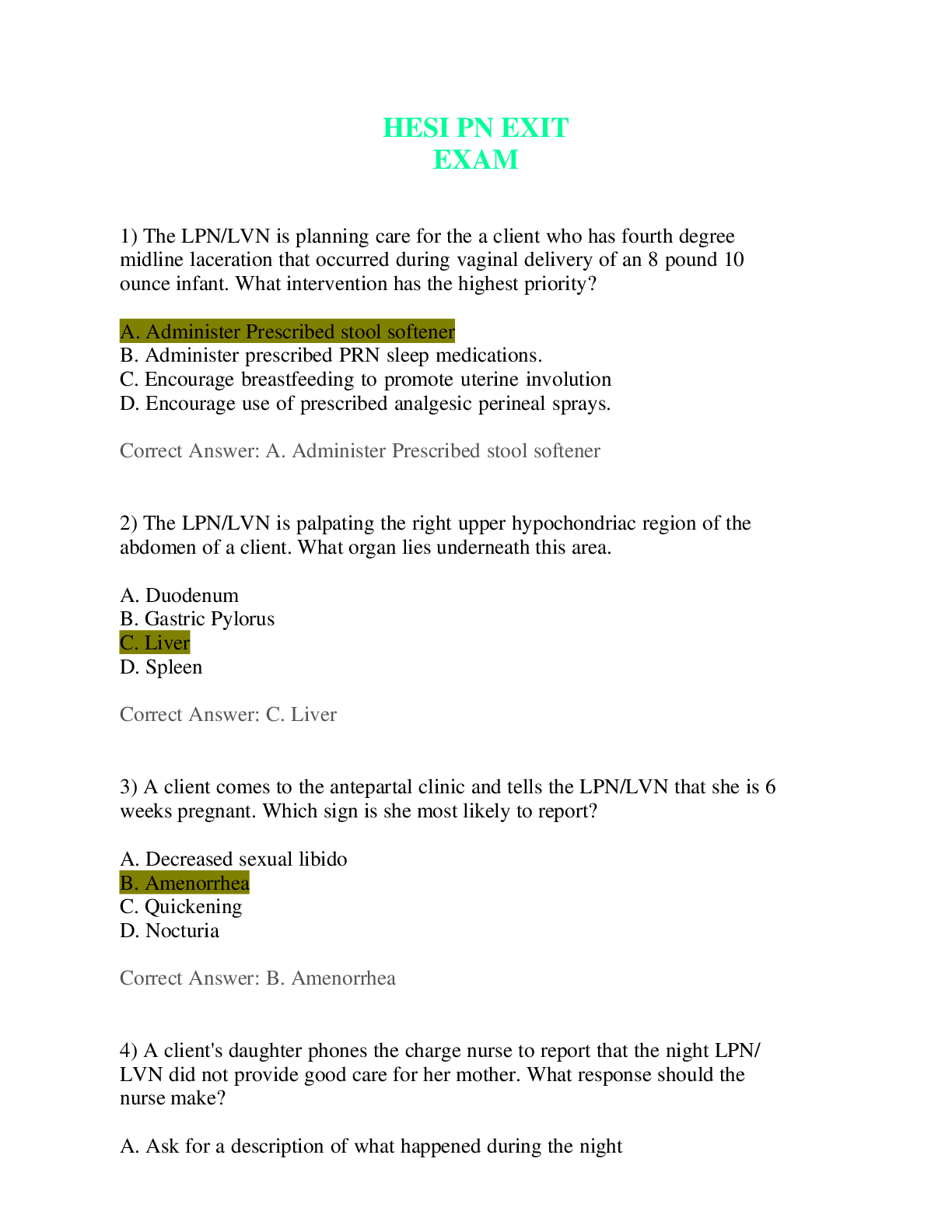
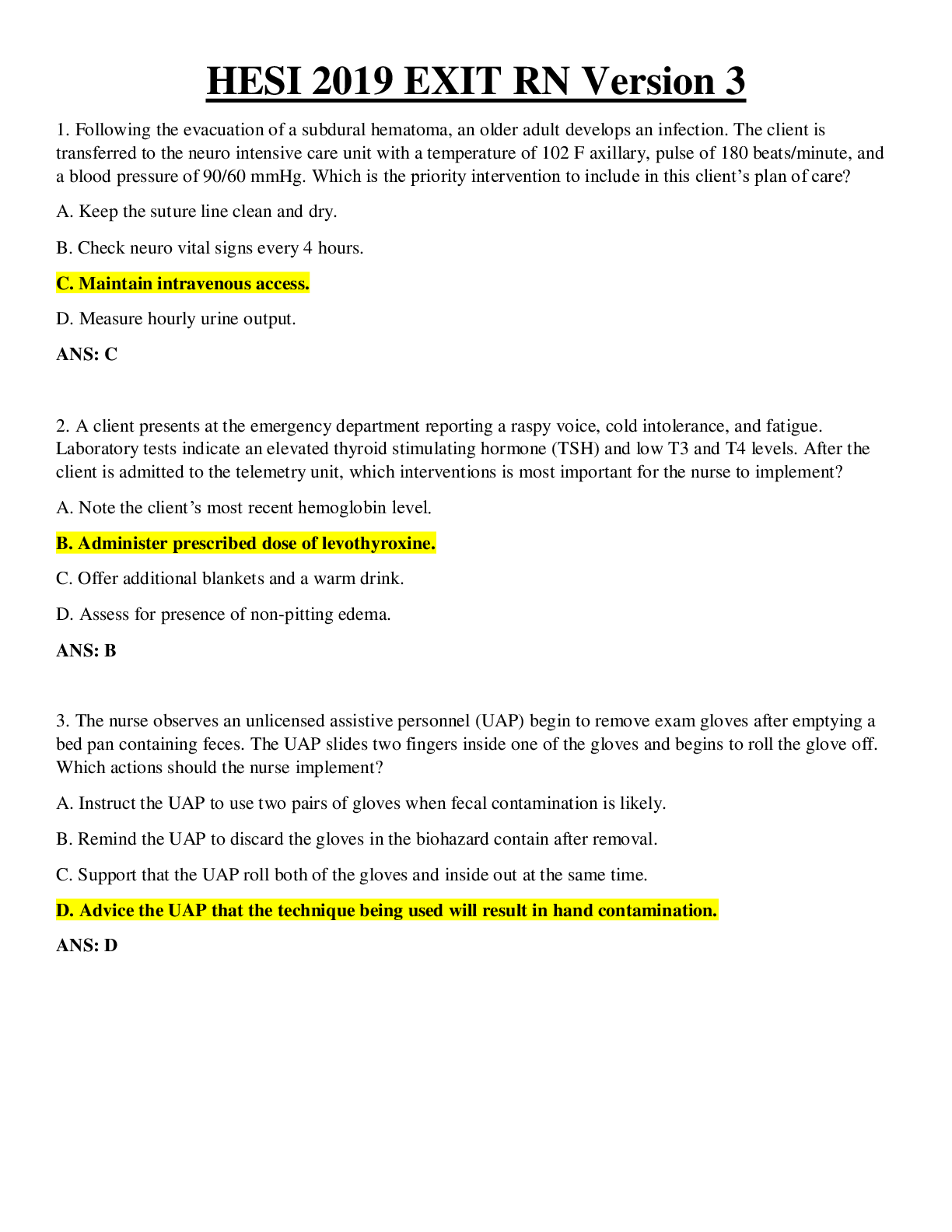
.png)
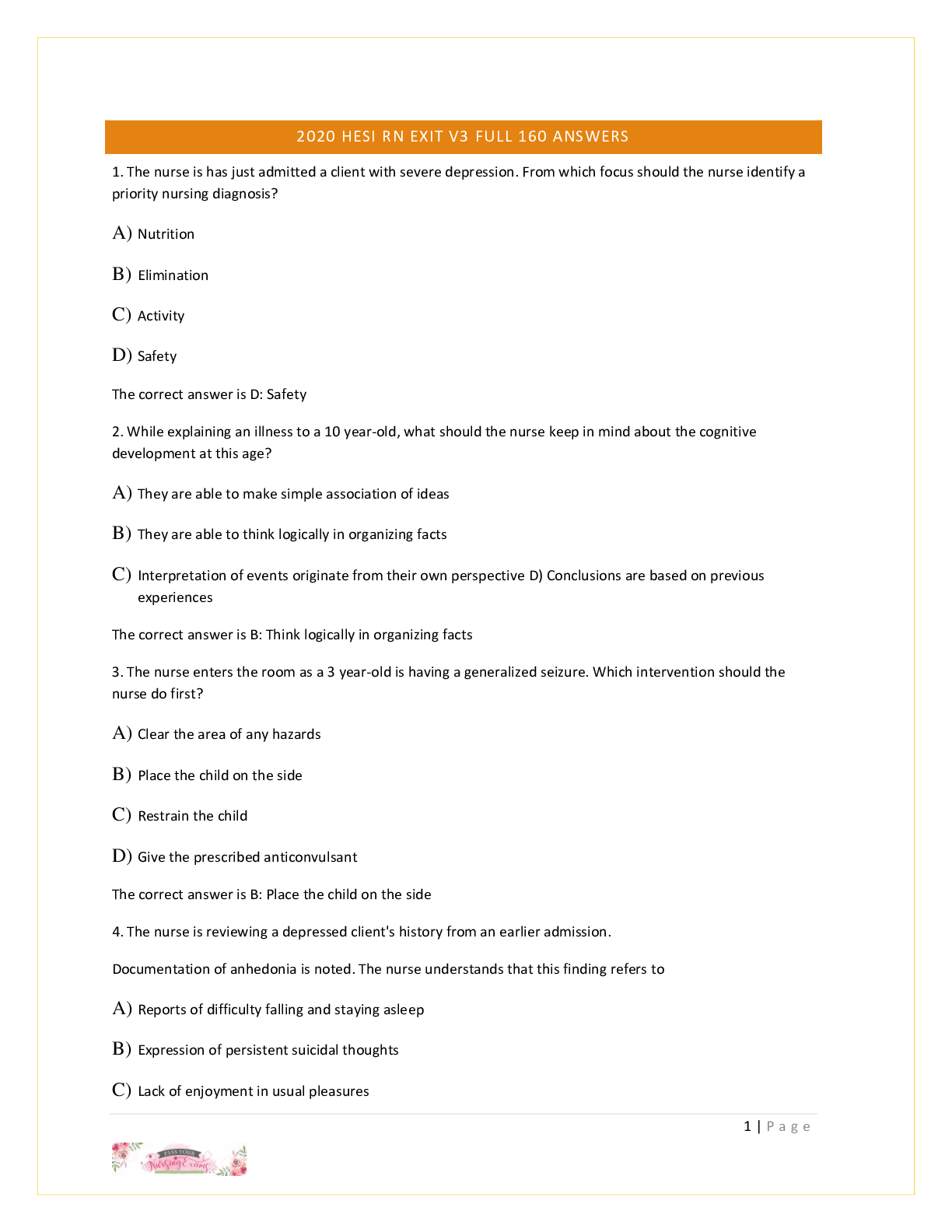
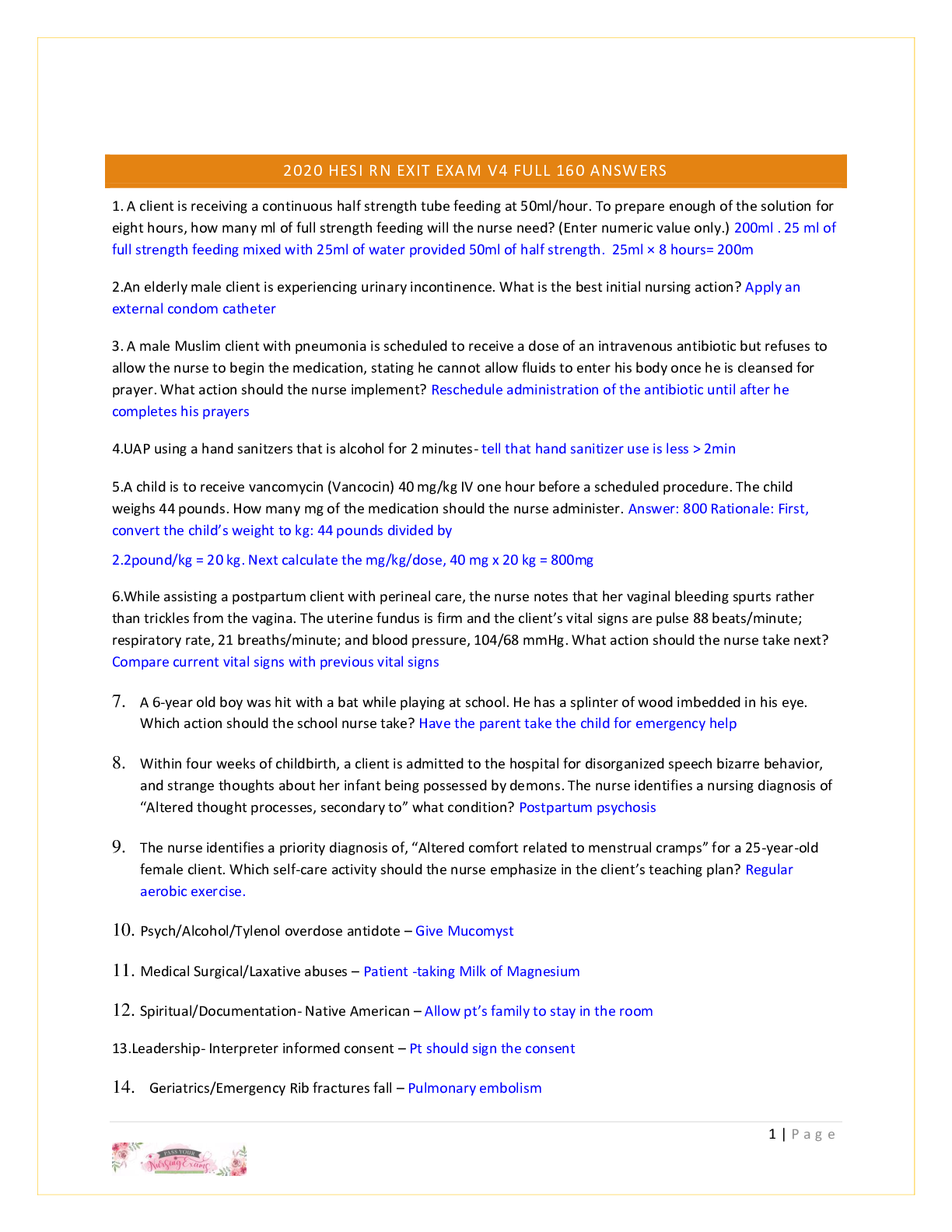
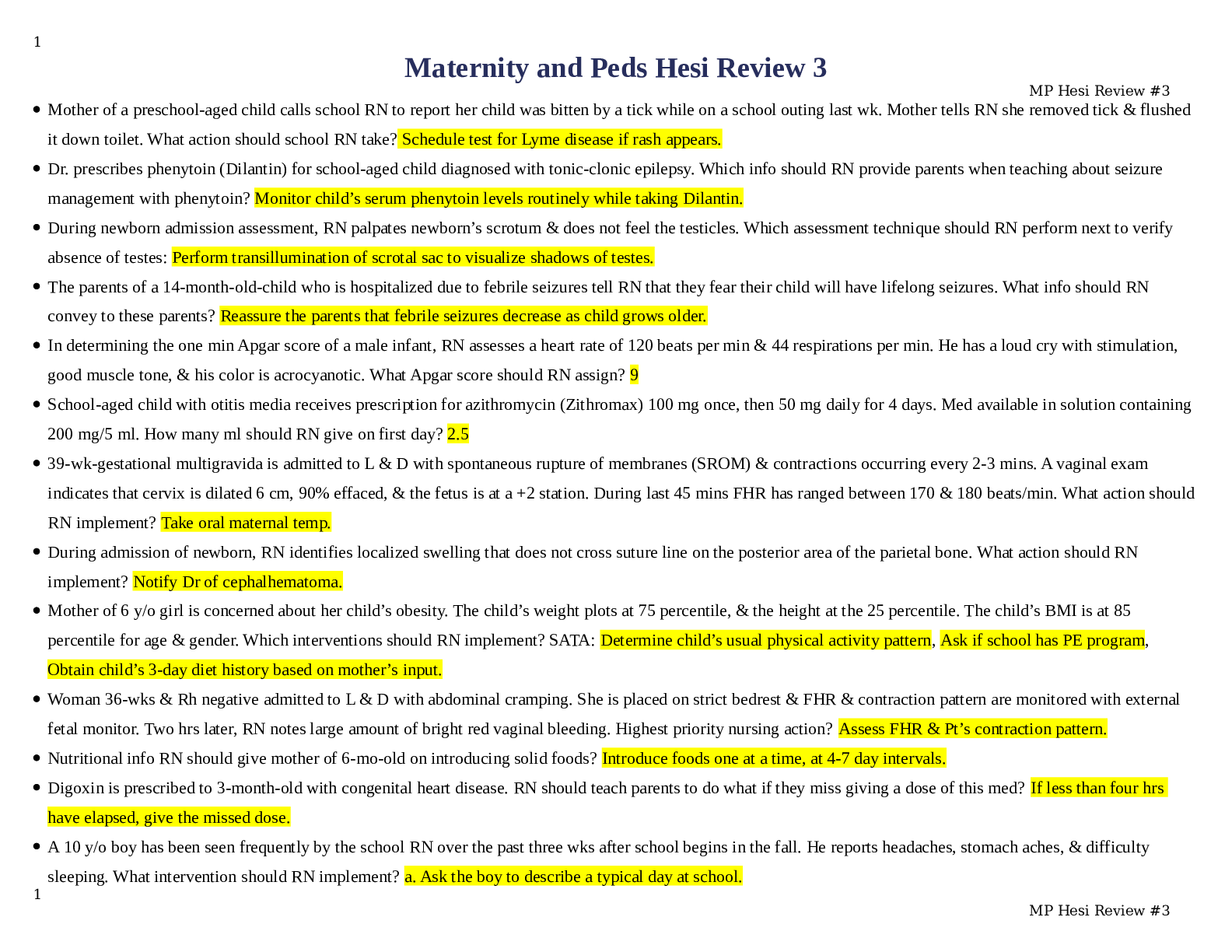
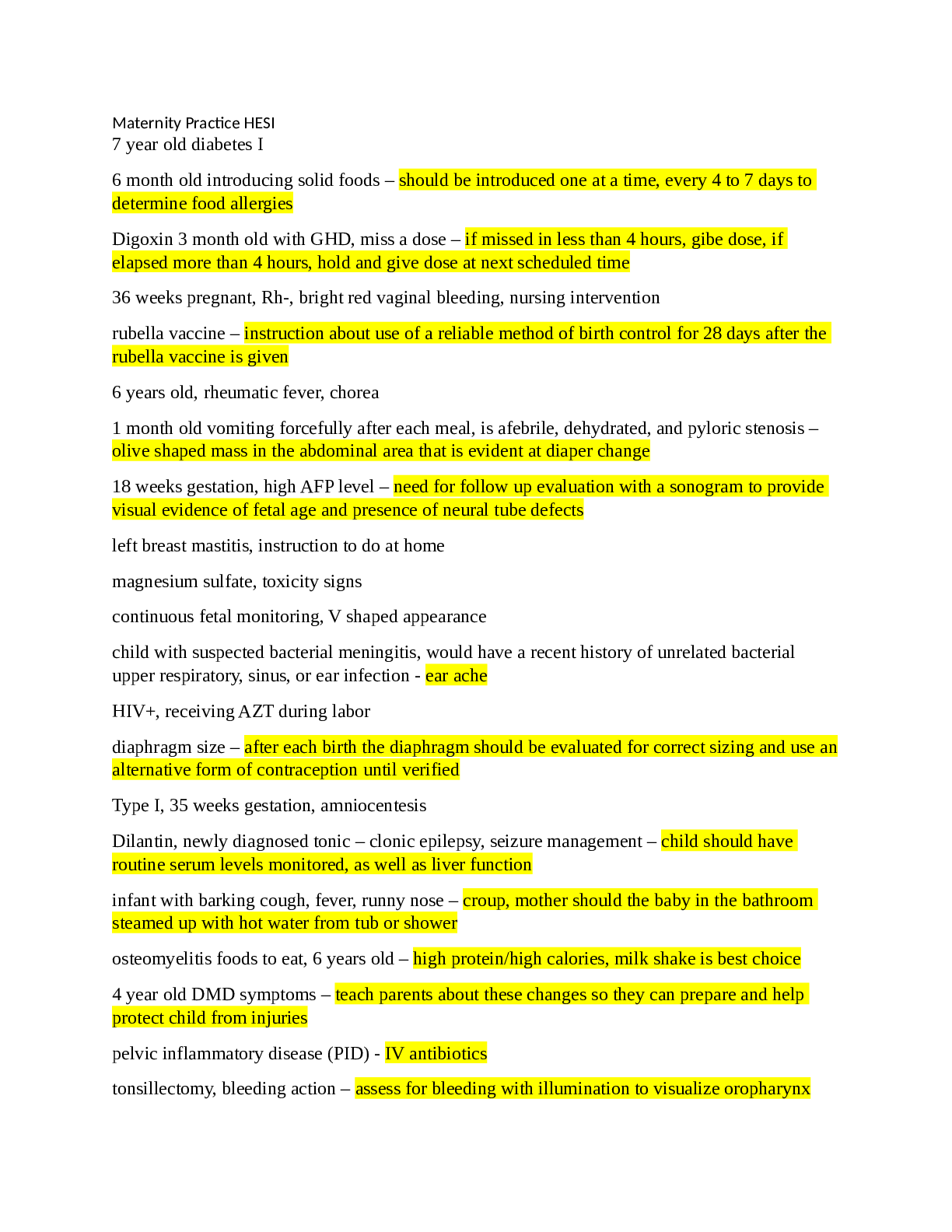
.png)
